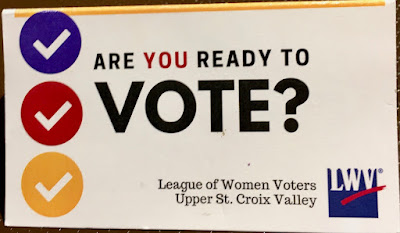I’ve been paying vague attention to the broadcasts of the January 6 hearings. Today’s testimony remined me of something I think too many of US have lost track of. I’ll quote here:
“Power tends to corrupt,” said Lord Acton, the 19th-century British historian. “Absolute power corrupts absolutely.” His maxim has been vividly illustrated in psychological studies, notably the 1971 Stanford Prison Experiment, which was halted when one group of students arbitrarily assigned to serve as “prison guards” over another group began to abuse their wards. ...
“In sum, the study found, power doesn’t corrupt; it heightens pre-existing ethical tendencies. Which brings to mind another maxim, from Abraham Lincoln: “Nearly all men can stand adversity, but if you want to test a man’s character, give him power.”
I’m deeply troubled but what the preceding implies about those who voted for Donald Trump and continue to vote for the likes of Mitch McConnell and Ted Cruz. Then again, when Bill Clinton, who brought US NAFTA and Welfare Reform, was the Democratic candidate, I probably voted for him, much to my later regret. Too much of our politics comes down to a dilemma akin to “Which eye do we want the sharp stick in?” My (our?) conundrum is enhanced when one looks at Britain and their parliamentary system and notes that they’re not doing much better. Brexit, anyone?
One of my pet theories is that we have become too dependent on politics and law. Lawyers are noted for their ability to split hairs and distort plain meaning. Politics is noted for causing hair pulling and obfuscating meaning. There are alternatives. One alternative has been proposed by Elinor Ostrum, who was the first woman to win the Nobel Prize for Economics.
Ostrom identified eight "design principles" of stable local common pool resource management:[38][39]
- Clearly defined the group boundaries (and effective exclusion of external un-entitled parties) and the contents of the common pool resource;
- The appropriation and provision of common resources that are adapted to local conditions;
- Collective-choice arrangements that allow most resource appropriators to participate in the decision-making process;
- Effective monitoring by monitors who are part of or accountable to the appropriators;
- A scale of graduated sanctions for resource appropriators who violate community rules;
- Mechanisms of conflict resolution that are cheap and of easy access;
- Self-determination of the community recognized by higher-level authorities; and
- In the case of larger common-pool resources, organization in the form of multiple layers of nested enterprises, with small local CPRs at the base level.
I’d really like to see how we might arrange for one or several blue ribbon commissions to review our current systems of governance, not as theory but as practiced, against those design principles. I fear that failure to undertake such an activity, or something comparable, may leave US with little alternative but to become engaged an a wholesale replacement of our governments in a nonviolent or other process. We’re beyond the stage at which tinkering will work unless we’re determined to rearrange those proverbial deck chairs.
In case you think I’m engaged in pure fantasy, I know of a couple of organizations and initiatives that allready exist and seem to be moving some parts of our world in a direction I believe necessary. One is the Initiative for Responsible Mining Assurance (IRMA) and its standard. The other is the ISEAL Alliance and their sustainability standards.
I don’t see any society ever being able or willing to pay for enough police to enforce good behavior defined only in law. And yet we have, it seems, been busy for decades replacing ethics with laws. I expect to return to this topic in the future so we’ll leave it here for now.
I Commit
I commit to vote becauseI'm pretty sure I grabwhatever I need from the worldand place it in my mindwhich is getting incrementallylike the commonsundeniably more toxic and sadyes I too walk aroundconsidering my intractable problemscomplaining it's too latefor more sonataseverything is already too beautifulmusic and anger won't save usyet I commit to talkingearnestly with Sarahabout the school boardit will be night and we will be sittingshoulder to shoulderat the old table we loveeach holding a pencillike grade school children left alone at lastthen in the morningbefore our son wakesI commit to holdingthis tiny bit of quicksilver(quick in the sense of livingin its very molecular natureit wants to usefully combine with yours)in my palm and to walkingup to the blue mailboxI pass most morningsin that familiar silenceunder those nameless little treeswhen all things that surround me wait
********************************************
Thanks for visiting. Come again when you can.
Please be kind to each other while you can.

No comments:
Post a Comment